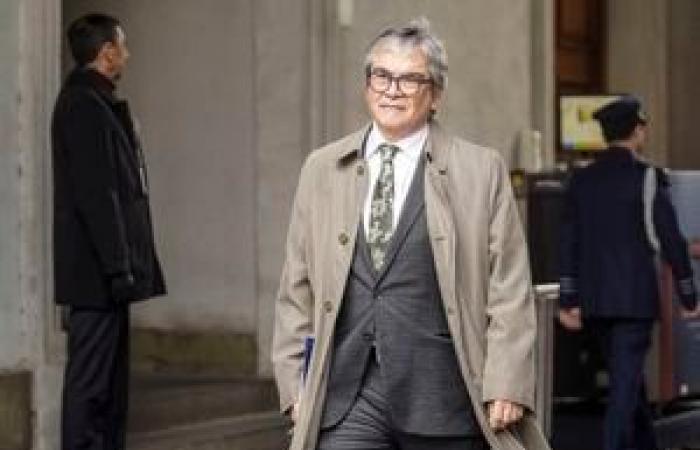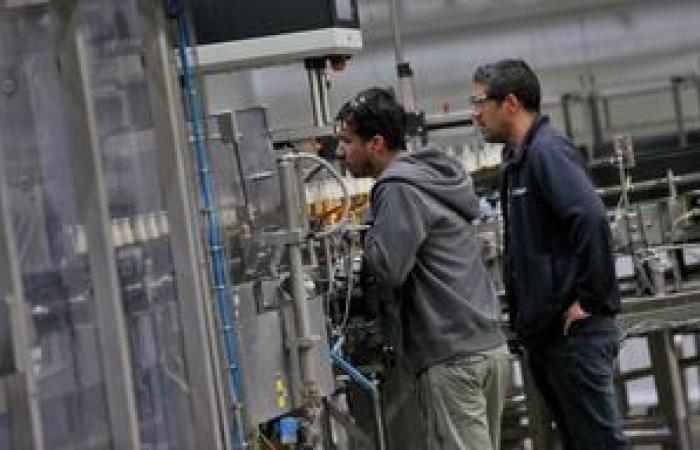The Minister of Finance, Mario Marcel, this week responded harshly to CMPC, after the company’s president, Luis Felipe Gazitúa, stated that the company did not have investments and projects in Chile “because it is impossible to do them. The Secretary of State, without mentioning Gazitúa or even the name of the company, He recalled the collusion case in which CMPC denounced itself and said the company’s position contrasts with what he perceives from other investors.
“They say they don’t want to invest more in Chile. For permit issues, well, of course a decision of that company. (But) The truth is that it contrasts a bit with what one sees in other Chilean and foreign investors,” the minister said at a press conference this Thursday.
And then he added: “I think that in the case of a company that was the protagonist of one of the most serious episodes of collusion In Chile, one would expect a little more prudence and a a little more commitment to the country”.
Marcel’s response to a specific company, or to the business sector in general, has other illustrious past examples.
In 2004, when Ricardo Lagos governed and his Finance Minister was Nicolás Eyzaguirre, some Spanish businessmen said that Chile was a least reliable country to invest in, due to the energy crisis in Argentina, which led to gas supply cuts. Eyzaguirre then sent one of his most memorable phrases: “This country is an example of transparency and the Spanish gentlemen, if they do not like the way things are done here, have the door open,” said the head of the fiscal portfolio in the six years of Lagos.
“Spanish companies would like Spain to have the transparency and speed of regulation that exists in Chile, there is no deception in asking, but let’s not make a mistake, “We are Chileans and as such we have to defend our heritage and the rights of Chileans, and not begin, as they say, to have our hearts shaken,” he added.
Eyzaguirre was succeeded by Andrés Velasco as Minister of Finance. first government of Michelle Bacheletbetween 2006 and 2010. After more than a year in office, Velasco harshly criticized the speech of the then president of the CPC, Alfredo Ovalle, at the 2007 Enade. “It seems like I live in another country,” he said bluntly.
“It is very important, before making these types of statements, to have the necessary information,” Velasco said in conversation with Radio Duna. And he added, in reference to Ovalle, that “he talks about the conditions for investing, well, what are the facts: The facts are that this year in Chile we are going to have a investment equal to 25% of GDP, the highest, listen to me carefully, the highest since we have comparable records. “Highest in this decade, highest in the last decade.” The next day and after Velasco’s words, Ovalle admitted: “I could having exaggerated in the form”.
Almost a decade later, and in the second administration of Michelle Bachelet, it was Rodrigo Valdés who launched harsh questions at the businessmen, while the labor reform was being processed. His call was for “more work and less whining.”
“More work and less whining. There are countless opportunities in Chile to do good business. We want to invite everyone to do those businesses that use the State so that we can provide them with help,” the Secretary of State stated in 2016, in an activity in Quilicura regarding the Productivity Agenda promoted at that time by the government.
Following Valdés’ statements, there was a response from the business world. Ricardo Mewes, who at that time was the head of the National Chamber of Commerceand today presides over the Confederation of Production and Commerce (CPC), said: “It is complex, because when we see that there is a labor reform that from the beginning we classify it as a bad reform, which also goes with a ruling from the Constitutional Court that will lead us to judicialize many processes of Negotiation with workerswhen we see that there is a contribution from a constitutional reform, All this creates an environment that is not very suitable for investment,” Mewes said.
And the president of Asimet, Juan Carlos Martínez, was disappointed with the words of Valdés. “It asks us for more work and I think we are working hard. full. There is no no one looking at the ceiling. What we have done is indicate what problems we see.”
In 2021, already in the second government of Sebastián Piñera, the Minister of Finance who replaced Felipe Larraín after the social outbreak, Ignacio Briones, targeted a businessman in particular: Julio Ponce Lerou, a shareholder of SQM. Regarding the Cascadas case, the head of the Treasury He indicated that the businessman “would undoubtedly be in prison in the US.”
“The relevant thing is to apply draconian sanctions to those who defraud the public faithbecause they are not only committing a crime that affects a third party, but it also has an effect on the rest, on the image, on the perceived legitimacy of the market and that is why there are countries where crimes that are not punished in Chileor they have low sentences compared to the US. There, the roosters go to jail and that’s fine,” he said in an interview with Via X. Ponce had been sanctioned by the Supreme Court for committing several violations of the laws of Corporations and the Stock Market.
And returning to Marcel, the current head of the Treasury already had harsh words a year ago, when the idea of legislating the tax reform was rejected and Marcel showed his anger in a long list of those who would celebrate. Among them, he said, the big capitals. “The celebration began for the parties most to the right of the political spectrum. I am sure that those who evade taxes and those who advise taxpayers to avoid taxes will celebrate, because they will have at least one more full year to be able to continue using the same tax avoidance mechanisms,” Marcel shot. And he continued: “We will surely also have a celebration of large capitals, which will no longer be subject to the wealth tax. Surely the lobbyists will also celebrate, who, until the last minute in the processing of this project, were sending communications to the parliamentarians, with a series of statements that, despite the fact that we discarded each of them, particularly the statements referring to the damages to SMEs and the middle class.”



